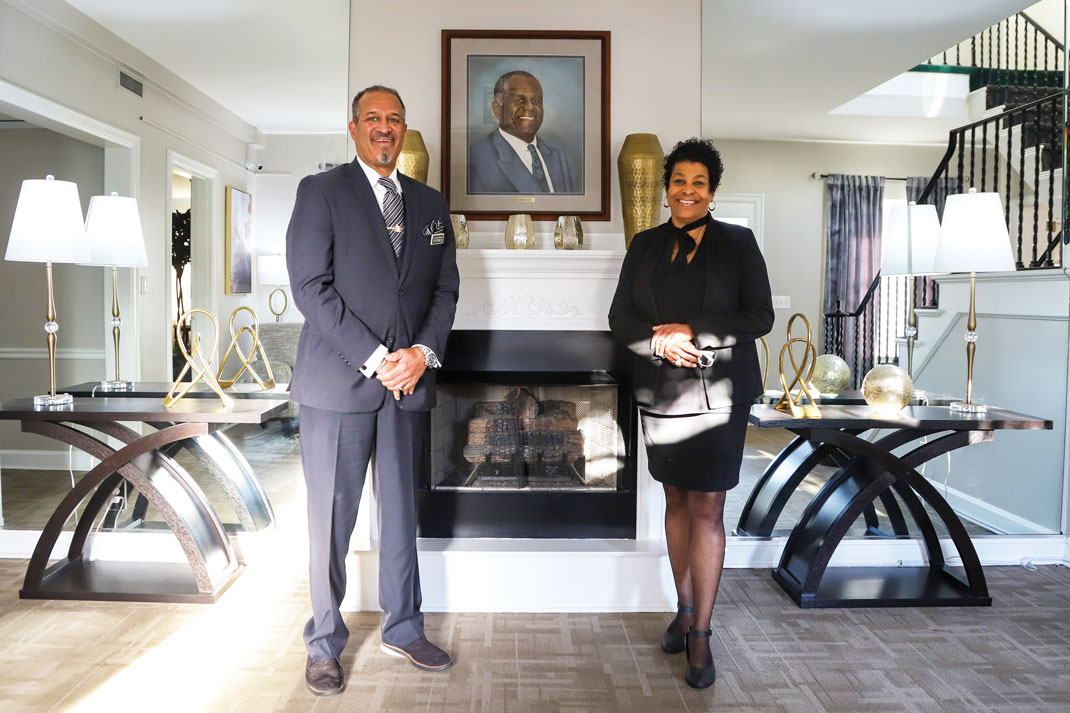There's a sense of joy in rooting for family-run businesses. What's not to love about personalized service, commitment to the community, and a sense of tradition and values?
Unlike so many faceless corporate entities, family-run businesses are our neighbors. But their significance is bigger than that.
According to the U.S. Census Bureau, family businesses make up about 90% of companies nationally, from small, two-person partnerships to Fortune 500 giants. And they account for half of the nation's employment and half of the U.S. gross national product.
But in this world of global consumerism, can family-run businesses continue to lead the way? The Harvard Business Review says yes.
The key lies in their unique perspective. Not only can they pivot with greater ease, they often look to the long-term rather than being preoccupied with meeting quarterly earnings targets.
For this report, we talked with leaders of five Chattanooga-area businesses, who have all defied the odds, reaching multiple generations in business. Discover their wisdom and strategies, as they share their stories.
Fischer Evans Jewelers / Founded 1869
Answered by Clarke Glover, principal
Family leadership history:
My father, Howard Glover, acquired Fischer Evans from Carter Evans in 1970. He had moved to Chattanooga from Columbus, Georgia, where he had started a second jewelry store for his father-in-law.
Dad was, and continues to be, a remarkable businessman. He took an already successful, 100-year-old Chattanooga business and made it thrive for the next 40 years.
Although my father and I worked together for only a few years after I graduated college, I learned a tremendous amount during that time. I moved away to pursue a career in investments and remained within the Fischer Evans periphery throughout the years, until I decided to come back to Chattanooga to take over the business after his retirement.
While Fischer Evans is second generation, my wife, Nico, and I are both third-generation jewelers. Both our grandparents were in the jewelry business.
Key to success:
Know what it truly takes to run the business. ... In order to run our small, yet complicated business, it is critical to be a generalist. Basically, knowing a fair amount about every aspect of the business.
There is rarely someone to guide you once you are at the helm. Your decisions are your own, so learning what you need to learn to operate and lead with confidence is imperative. People will also face problems their predecessors did not. The key is to maintain or add to your competitive edge within your marketplace.
Advice for other family-owned businesses:
The generation currently running the business should think far out enough; not only about succession strategies, but also about how to shape the business for a future management scenario. It is always possible that there might not be a next generation to take over, as children may not be interested in the business for a while.
That said, I believe the next generation should learn everything they can about their family business while they have the chance. They should realize they are fortunate enough to be able to learn from a parent or relative, who likely has much to share.
Children or young adults should be and remain curious about what has made the business successful. Even if they pursue a different path or career, they may be able to bring other talents and skills to the business down the road.
On handling family disagreements:
Overcoming family disagreements in business is possible by establishing clear roles, open communication and transparency. As important as it is to recognize that there has to be one business head, creating a collaborative environment to overcome any challenges is also worth pointing out.
A family usually shares values, trust and respect for one another. Leveraging the experience and abilities of any involved family-members will help shape the business in everyone's best interest.
If the current leadership has created or maintained a successful environment, then pay attention to what has created that success. Nonetheless, the next generation needs to learn how to make their own decisions.
Leaning on the business success and failure stories, while allowing latitude for new ways of operating is critical. At some point, the new generation will have to lead the way they were meant to lead. The earlier you learn to lead with confidence, the better.
Fowler Brothers Co. / Founded 1885
Answered by Carter Fowler, president & COO
Family leadership history:
The Fowler Brothers goes back to 1885. It all started with my great-grandfather going door to door with a horse-drawn carriage and a blind horse, selling glassware. Each family that he stopped and talked to had different needs; and so my ancestors acknowledged those needs. By 1911, the downtown store was opened, and by 1930 was incorporated as The Fowler Brothers. But what happened during that time is that we learned what the consumer wanted — and they wanted a lot of different things. So we had everything from the glassware, which we were founded on, to fine crystal and China, to silver, to pianos, to washing machines and dryers, appliances, refrigerators, to furniture, to outdoor furniture, to rugs and carpet — to just whatever you might need for the home. In 2016, I became the first company president, which marked the company's fifth generation of family leadership.
Key to success:
We're absolutely different than the corporate world. Being a family business, our customers are like family, our employees are like family, and we behave a little differently because of that.
We have people who have shopped with us for generations. It's not uncommon to have a grandparent, parent and child come in shopping together on the same day.
As far as a succession strategy, I'm the one who took over a number of years ago. But it's always stayed in the family, and there has always been a family member to step up and carry on.
Right now we have two potential sixth generations, who may or may not want to come into the family business. In the past, there was always somebody in training, if you will. I started working here when I was 15, and I have literally worked every single position in the company.
We believe that the formula for success has been offering the finest quality furniture, the best customer service possible and a guaranteed price — it's a combination that we just don't see in today's world. Our policies are firm but flexible. Each situation needs to be handled individually and differently. That's how families do stuff. The rigidity of the corporate world sometimes is a restriction, and we don't have that.
The way we advertise, the way we speak to our customers, the way we deliver furniture, the way we do everything here is special and more like a family. We're not just numbers.
Advice for other family-owned businesses:
I think the most important thing is staying true to who you are and what you know. Be flexible. Always learn. Always listen.
My dad always said, "Remember who you are — you're a Fowler." And I tell my kids that, too. It affects how you behave; it affects how you treat others; it affects the words that come out of your mouth.
And I think the most important thing is is that, yes, I run this company; but we give it up to the Lord. We are a Christian family company, and no matter what, this all comes from Him.
On handling family disagreements:
We don't have a lot of family disagreements regarding our business. My mother is still living; my sister is still a shareholder of the company. If I had all kinds of cousins and all kinds of scenarios like some companies ... the more people in play, the more you can have disagreements.
But we just deal with things in a loving way, in a caring way. We're not rigid. I'm always willing to see something from a different point of view.
We don't live in a fight here, like some companies do. I think the biggest difference between a Christian family company and a family company is the way we work things out, the way we work together.
Franklin Funeral Home / Founded 2008
Answered by John Franklin Jr., co-owner
Family leadership history:
Our grandfather, George Washington Franklin was the first Black undertaker in Chattanooga, and was the founder of G.W. Franklin Undertakers, which he established in 1894. When he passed away in 1928, his oldest children, Ben Franklin and Mabel Franklin Taylor, succeeded him. In 1952, our father, John P. Franklin Sr., and his sister, Mabel, formed a new partnership that included Reuben Strickland. In 1971, Fred Reynolds was brought into that partnership that spanned over 56 years. In 2008, my father and I separated from that firm, starting the John P. Franklin Funeral Home, which is independently owned and operated. My sister, Cheryl Franklin Key, joined the partnership at that time. My father passed away in 2018, and Cheryl and I continue to operate the funeral home today, with the help of our incredible staff.
Key to success:
Our father was a licensed funeral director, but was also a well-known educator, civic leader and an elected city official. His philosophy was to always provide quality of service to the community. It was equally important to him to give back and support a community that has supported our us for over over a century. And so in following his guidance, we are also totally vested in Chattanooga community. That's how his legacy has continued up to this point.
As we have moved forward, we have adopted many of the principles he taught us and gave to the community. One of them is that a business is not completely independent; it's created and sustained by being totally committed to growth and to the community, which includes sharing and giving back.
Advice for other family-owned businesses:
Have a good team around you to assist with doing the work. You can't do it alone. Make sure you develop your team and that they represent the same ideals the company represents. Their passion about the work should be equal to yours. That creates a customer experience that is exceptional. Find people who share the same vision and zeal.
On handling family disagreements:
Defining our individual roles and the division of labor as it relates to operations has been key. When we learn to trust each other in those roles, we develop a sense of respect. The mission and the goals of the business supersede any family disagreements or differences of opinion.
Lodge Cast Iron / Founded 1896
Answered by Lee Riddle, vice president of sales and marketing
Family leadership history:
Lodge Cast Iron was first founded in 1896, by Joseph Lodge. From then until 2019, Lodge has been run by a member of the Lodge/Kellerman family. The company is still 100% owned by descendants of Joseph Lodge.
Between 1940-2001, Richard Leslie Lodge, Charles Richard Kellermann, William Leslie Kellermann and Bob Kellerman served as presidents at Lodge and have all stood by the family values and commitment to high-quality cookware. As an example, I served on the board of directors from 2001-2007 and now am Lodge's vice president of sales, and a fourth-generation Lodge family member.
In 2019, Mike Otterman became the company's first non-family CEO after serving as the senior vice president of sales and marketing. While the company is not currently led by a member of the Lodge family, the family is still closely involved and considers all Lodge employees family.
Key to success:
We attribute a lot of our success to staying true to our core values, which includes acting with integrity and treating all people with dignity; providing stability and security for our employees and their families; focusing on safety but also having fun; creating a "we" environment; and "staying scrappy."
Advice for other family-owned businesses:
The best advice I can give regarding succession is don't be afraid to get some outside help to guide you through the process. If you don't get it down on paper, it will be more difficult and painful.
For younger and future generations, it can be beneficial to gain outside work experience for additional perspective. Learn from the past, and plan for tomorrow, but make sure you lead and live in today. Stay humble and be careful of getting greedy.
On handling family disagreements:
I don't know if there is a silver bullet approach, but I do believe that the more our executive team collaborates on both short- and long-term strategy planning, the better we do at not letting details trip us up. And remember — it doesn't hurt to be a balanced referee sometimes.
Rock City / Founded 1932
Answered by Doug Chapin, president & CEO
Family leadership history:
We have had four generations of family leadership at the company. Rock City was founded in 1932 by Garnet and Frieda Carter, who passed it to Garnet's nephew, E.Y. Chapin III during the 1950s. My father, William "Bill" Chapin took over in 1985; and I bought it from my parents in 2022.
Key to success:
In a family-run business, you can make decisions based on your values, not just bottom-line performance. That can have pretty amazing outcomes for your customers, your employees and your community.
The guiding philosophy of See Rock City Inc. has been to steward our places for our guests and our partners. Rock City was here long before any of us got here and hopefully will still be welcoming guests long after we are gone. To that end, we are willing to take a longer-term view to investing in our places and our people.
Regarding succession strategy, my parents were always very keen on never making any of us children feel pressure to come work for the family business. Family business can be hard; and in our family, the business had led to some pain and conflict in the past.
They let us know there was opportunity here, with each of my sisters and me working our first jobs in front line positions at Rock City growing up. They encouraged us to follow our passions professionally, and never pressured us to work for the business.
I followed the advice of a mentor to learn about the business early in my career; but until I joined as a manager, really had not contemplated a future in the business. It wasn't until I was in it for years, testing the waters of what I was passionate about and learning about it from the inside, that I realized I wanted to pursue a career in the business. The freedom my parents gave me and my sisters to explore other options, coupled with the advice to learn about the business from the inside were great tools to chart a course forward.
Advice for other family-owned businesses:
To borrow a phrase from one of my dad's best friends and a current board member: "Educate, don't litigate." Learning about how other family businesses have sustained, and all of the creative ways that can take shape was immensely helpful to get a vision for the future.
The most helpful thing we did to develop a succession strategy for the business was get involved in Northwestern's Kellogg School of Business Family Business Institute. That program gave us the tools to learn what it means to be involved in the family business and talk about it with each other.
How to handle family disagreements:
Remember that family always comes first. The business can fail, and things can change, but you will always be family — and that should come first.
By the numbers
* 30% of family businesses survive the transition from first to second generation
* 12% survive the transition from second to third generation
* 13% remain in the family for more than 60 years
* 47% of family business owners expecting to retire within five years do not have a succession plan
How do family businesses thrive?
* Good governance: 94% are controlled by supervisory or advisory boards
* Focus on the next generation: More than 40% include younger family members on boards and committees to nurture business and management skills
* Values & culture: 74% of family-owned firms report stronger values and culture
Source: score.org
READ MORE
* One for the Ages: Chattanoogans explore generational perspectives in the modern workplace




